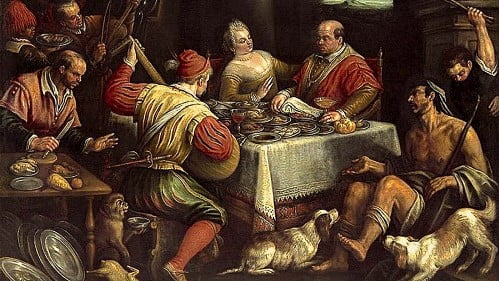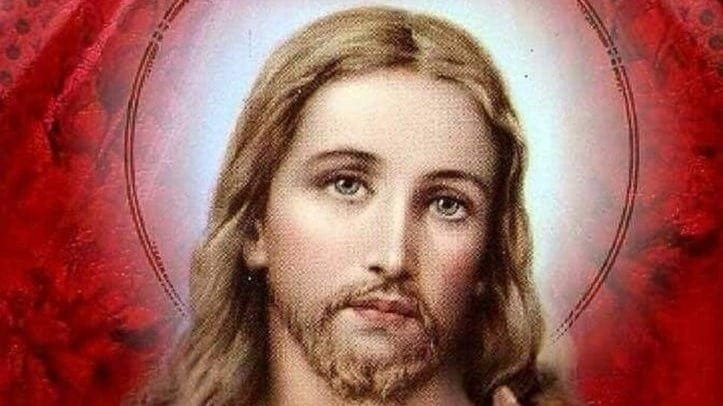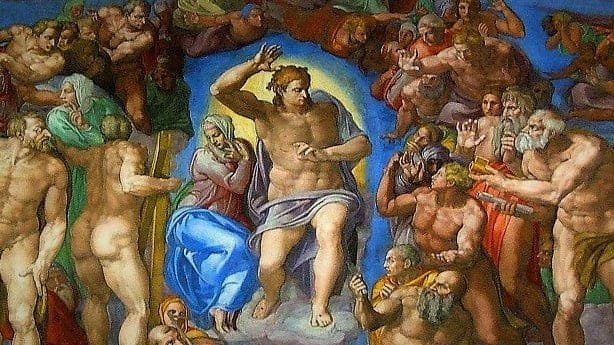THURSDAY 2ND WEEK OF LENT MASS READINGS AND COMMENTARIES:
THE RICH MAN AND LAZARUS
THE RICH MAN AND LAZARUS
MASS PRAYERS AND READINGS

READING I
Jer 17:5–10
Thus says the Lord: Cursed is the man who trusts in human beings, who seeks his strength in flesh, whose heart turns away from the Lord. He is like a barren bush in the desert that enjoys no change of season, but stands in a lava waste, a salt and empty earth. Blessed is the man who trusts in the Lord, whose hope is the Lord. He is like a tree planted beside the waters that stretches out its roots to the stream: it fears not the heat when it comes, its leaves stay green; in the year of drought it shows no distress, but still bears fruit. More tortuous than all else is the human heart, beyond remedy; who can understand it? I, the Lord, alone probe the mind and test the heart, to reward everyone according to his ways, according to the merit of his deeds.
RESPONSORIAL PSALM
R. Blessed are they who hope in the Lord.
Blessed the man who follows not
the counsel of the wicked
Nor walks in the way of sinners,
nor sits in the company of the insolent,
But delights in the law of the Lord
and meditates on his law day and night.
R. Blessed are they who hope in the Lord.
He is like a tree
planted near running water,
That yields its fruit in due season,
and whose leaves never fade.
Whatever he does, prospers.
R. Blessed are they who hope in the Lord.
Not so, the wicked, not so;
they are like chaff which the wind drives away.
For the Lord watches over the way of the just,
but the way of the wicked vanishes.
R. Blessed are they who hope in the Lord.
VERSE BEFORE THE GOSPEL
Happy are they who have kept the word with a generous heart, and yield a harvest through perseverance.
- Lazarus’ miserable life was accentuated by St. Luke’s description of the dogs licking his sores, not that they alleviate the poor man’s suffering, but rather, to the Jews, dogs are unclean animals which cause legal impurity (Cf. Leviticus 11:27-28) and thus not considered as domestic animals.
- John Paul II once said: “We cannot stand idly by, enjoying our own riches and freedom, if, in any place, the Lazarus of the twentieth century stands at our doors. In the light of the parable of Christ, riches and freedom mean a special responsibility. Riches and freedom create a special obligation. And so, in the name of the solidarity that binds us all together in a common humanity, I again proclaim the dignity of every human person: the rich man and Lazarus are both human beings, both of them equally created in the image and likeness of God, both of them equally redeemed by Christ, at a great price, the price of the ‘precious blood of Christ’ (1 Pet 1:19)” (Homily in Yankee Stadium, 2 October 1979).
- “When the poor man died, he was carried away by angels to the bosom of Abraham. The rich man also died and was buried, and from the netherworld, where he was in torment, he raised his eyes and saw Abraham far off and Lazarus at his side.”
- Wealth, earthly possessions, as also suffering, are fleeting realities: death marks their end, and the end of our earthly pilgrimage as the time to accept or reject God, live for Him or for ourselves, and of our capacity to sin or to merit reward for doing good. Immediately after death we begin to enjoy our reward or to suffer punishment, as the case may be. The Magisterium of the Church has defined that the souls of all who die in the grace of Cod enter heaven, immediately after death or after first undergoing a purging, if that is necessary.
- What does Abraham’s bosom signify? refers to the place or state “into which the souls of the just before the coming of Christ the Lord, were received, and where, without experiencing any sort of pain, but supported by the blessed hope of redemption, they enjoyed peaceful repose. To liberate these holy souls, who, in the bosom of Abraham were expecting the Saviour, Christ the Lord descended into hell” (Catechism of the Council of Trent, I, 6, 3).
- Rather, he was condemned to the place of torment and suffer the scorching flames because he was indifferent to the needs of the poor Lazarus who was “lying at his door” and was longing to eat the scraps which fell from the rich man’s table.
- “Christ demands openness to our brothers and sisters in need — openness from the rich, the affluent, the economically advantaged; openness to the poor, the underdeveloped and the disadvantaged. Christ demands an openness that is more than benign attention, more than token actions or halfhearted efforts that leave the poor as destitute as before or even more so (John Paul II, Homily in Yankee Stadium, 2 October 1979).”
“I ask you and I beseech you and, falling at your feet, I beg you: as long as we enjoy the brief respite of life, let us repent, let us be converted, let us become better, so that we will not have to lament uselessly like that rich man when we die and tears can do us no good. For even if you have a father or a son or a friend or anyone else who might have influence with God, no one will be able to set you free, for your own deeds condemn you (St. John Chrysostom, Homily on 1 Corinthians).”
Stay safe and God bless! Fr. Rolly Arjonillo
VIDEO COMMENTARY
TOPIC: WOULD YOU RATHER BE RICH OR POOR?
The reflection question is a very tough one, isn’t it? We all want to have comforts in life. That is why we work hard. We want to give our families all their needs and even their wants. Having wealth is not bad. The Jews believe that righteousness is rewarded with wealth by God. But very often, the happiest people in the world are not those who have much (in material wealth), but those who have much less. In today’s gospel reading, this is the only time Jesus provides a name to a character in his parables — Lazarus — which means El-azar, ‘God has helped.’ This is a reminder to us that God’s heart is for the poor. Deeply and resolutely for the poor.
Stay updated: subscribe by email for free TO OUR NEW WEBSITE www.catholicsstrivingforholiness.org (PUT YOUR EMAIL IN THE SUBSCRIBE WIDGET).
We are also in www.fb.com/Catholicsstrivingforholiness. Kindly help more people in their Christian life by following our page and inviting your family, friends and relatives to do so as well. Thanks in advance and God bless you and your loved ones! Fr. Rolly Arjonillo


